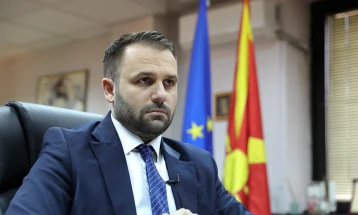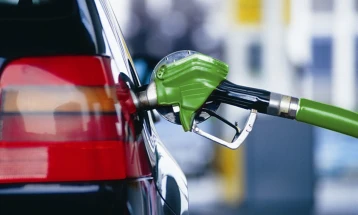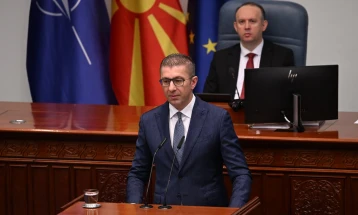Pavlova: Steady progress with structural reforms underpins North Macedonia economic recovery
- In recent years, North Macedonia made steady progress with the implementation of structural reforms, including measures to foster market liberalisation and fiscal transparency.

Skopje, 20 September 2023 (MIA) - In recent years, North Macedonia made steady progress with the implementation of structural reforms, including measures to foster market liberalisation and fiscal transparency. The sound economic policies and a favourable business climate are reflected in the country’s strong standings in the latest edition of the World Governance Indicators, says European Investment Bank (EIB) Vice-President Lilyana Pavlova in an op-ed on last week's Skopje Economic and Finance Forum (SEFF).
"Financial sector metrics have remained comforting, with banks that are adequately capitalized, profitable and liquid. In the first quarter of 2023, real GDP growth accelerated to 2.1% year-on-year (from 0.6% in the previous quarter), supported by the positive contribution of net exports which more than offset the decline in domestic demand. Economic growth is projected to remain positive and around 2% this year, and to further expand to 3.4% in 2024, according to IMF projections," says Pavlova.
The EIB Vice-President says stronger economic ties with the EU can lift growth prospects in the Western Balkans.
"Growth in the Western Balkans is expected to decelerate further this year at 2.1%, impacted by tighter financing conditions and the negative effects of inflation figures remaining above the desired levels. A gradual recovery is expected over the course of the next three years, with growth averaging 3.6% (IMF April 2023 WEO). Inflation is expected to decelerate to 8.4% on average in July 2023, from the peak of 11.9% recorded in 2022, and to decline further next year to around 4% on average," says Pavlova.
According to her, the main downside risks in the region stem from more limited fiscal space, the possible materialization of the delayed effects of monetary policy tightening and heightened geopolitical uncertainty.
"In the face of such risks, prudent policies—including the gradual reduction of public debt levels and continued vigilance against financial tremors—will be key to support macroeconomic stability and preserve investors’ confidence. Meanwhile, further progress on the EU accession progress will enhance the business environment and attract new investments from abroad. Foreign direct investments in the Western Balkans have been a key driver of growth and technology transfer over the last two decades, underpinning the integration into global value chains. The total stock of FDI stood at EUR 87 billion at the end of 2022, out of which 60% originated from EU countries," notes Pavlova.
The region, she adds, should continue to build on its competitive advantage of strong relations with EU countries, as an anchor for resilience and sustainable development.
"Further investments in green technologies and digitalisation will unlock additional growth drivers and facilitate economic convergence with EU countries. Efforts should also be put to support skills development and the modernisation of the education system. As the lack of access to finance continues to constrain SMEs’ growth, attention should be placed on young innovative firms and start-ups that are particularly financially constrained," says Pavlova.
The EIB Vice-President says sustainable development and green energy should be prioritized.
"Through its dedicated branch EIB Global and the representation office in Skopje, the EIB has been delivering substantial support for the green transition, energy security and private sector growth in North Macedonia. It is also providing technical assistance to contribute to improving local project management capacities and speed up project implementation. Since 1991, the EIB has invested around EUR 1.1 billion in the country, mainly in support of environmental, transport, energy and SMEs projects," says Pavlova.
This year, EIB Global signed a EUR 70 million investment grant for the Skopje Waste Water Treatment plant – the largest EU project grant ever mobilised in the country. Combined with the implementation of the municipal water infrastructure programme, this will help deliver improved water supply, wastewater and flood protection infrastructure to 80 municipalities and some 700,000 people.
Leveraging upon its long-standing partnership with the Development Bank of North Macedonia and other local commercial banks, the EIB has also signed a EUR 100 million loan, complementing with a EUR 1 million technical assistance grant, to support energy efficiency and decarbonisation of Macedonian businesses through increased access to green finance.
In line with its mission to be the EU climate bank, the bank is committed to ensuring a just energy transition by various initiatives, which includes providing support to the successful integration of renewables into the country’s electricity network.
The EIB VP says well-targeted and cross-sector investments are fundamental for sustainable and resilient growth.
"As the Western Balkan economies were gradually recovering from the twin shocks of the pandemic and spill-overs from Russia’s war against Ukraine, extreme weather events and natural disasters during the summer inflicted new damages. Their devastating effects come at a time of already stretched national budgets and weak growth indicators.
Against this backdrop, the EIB sees well-targeted and cross-sector investments as key to tackling these compounded challenges. Going forward, sustainable growth will rely on our ability to combine effective policies, advanced skills, additional financing and global partnerships to support the green and digital transition, innovation and climate resilience. We are already leading the way in meeting these ambitions in the EU and beyond," underlines Pavlova.
Photo: EIB







